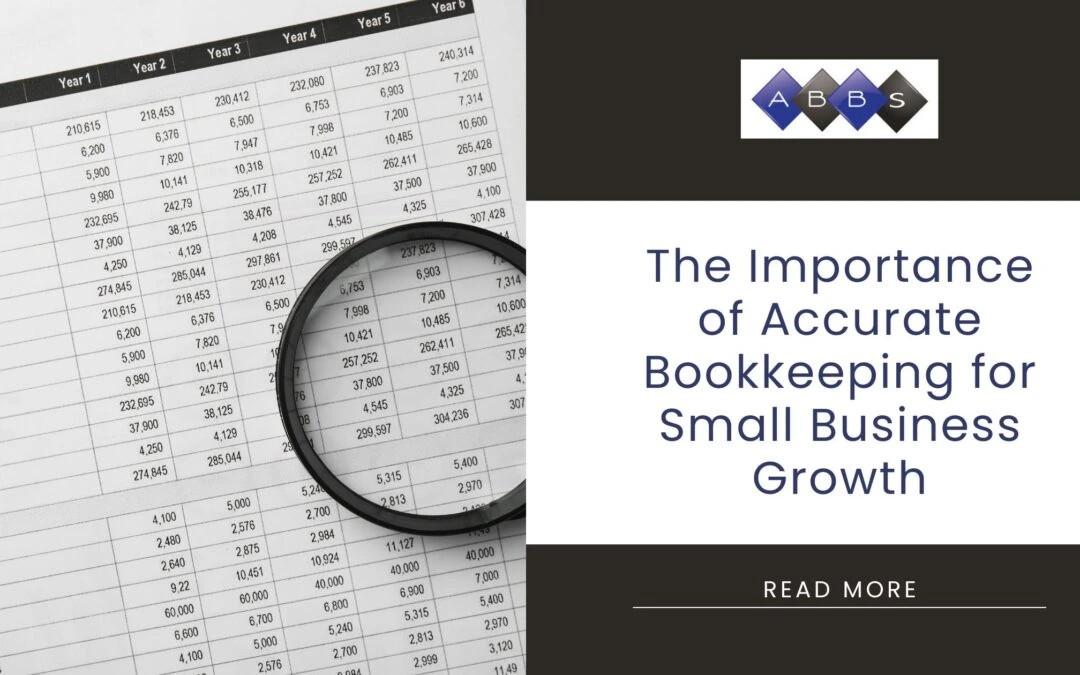- Accurate bookkeeping provides clarity, improves decision-making, and strengthens compliance, laying the foundation for small business growth and resilience.
- Professional bookkeeping support allows business owners to focus on growth priorities while ensuring their finances remain organized and accurate.
- A Better Business Solution offers dependable bookkeeping services that empower small businesses with confidence, clarity, and professional financial support for sustainable growth.
Running a small business comes with many responsibilities, but one of the most powerful tools for success often goes underappreciated: accurate bookkeeping. While bookkeeping may sound like a routine administrative task, it is the foundation that helps owners understand their financial health, make strategic decisions, and prepare for growth.
Without a strong grasp of finances, even businesses with great products or loyal customers can struggle to sustain operations. Accurate bookkeeping provides clarity, accountability, and the insights necessary to scale confidently.
Why Accurate Bookkeeping Matters for Small Businesses
Small business owners frequently juggle multiple roles like managing operations, customer service, marketing, and more. In the middle of all this activity, financial record-keeping can feel secondary. Yet neglecting accurate bookkeeping often leads to confusion, missed opportunities, and even costly mistakes.
Precise financial records help owners track income, expenses, debts, and profits. This knowledge goes beyond balancing the books; it gives a clear snapshot of how the business is performing at any given moment. Reliable data empowers owners to forecast, budget, and plan for both short-term needs and long-term goals.
Accurate bookkeeping also strengthens credibility with outside parties. Lenders, investors, and vendors all rely on transparent records before extending trust or resources. A business with disorganized or inconsistent financial statements often struggles to secure funding or negotiate favorable terms. On the other hand, clear and accurate records inspire confidence, demonstrating that the business is well-managed and financially stable.
Building a Foundation for Growth
Growth for a small business is rarely accidental—it is the result of consistent decisions backed by accurate information. Bookkeeping forms the backbone of this process by helping owners understand where money is coming from, where it is going, and how those patterns align with their goals.
When financial records are up to date, businesses can identify their strongest revenue streams and uncover inefficiencies. For instance, a business may realize that a particular service generates high revenue but also involves disproportionately high expenses. Accurate bookkeeping allows owners to spot these trends early and take corrective action.
Furthermore, accurate bookkeeping helps small businesses manage cash flow effectively. Cash flow issues are among the leading causes of small business failure, often stemming from a lack of insight into financial patterns. By carefully tracking receivables and payables, owners can anticipate shortages, plan for seasonal changes, and avoid the stress of unexpected shortfalls.
Accurate Records Support Better Decision-Making
Every decision in business carries financial consequences. Whether it’s hiring a new employee, investing in equipment, or expanding into a new market, understanding how these choices fit into the company’s overall financial picture is essential.
Accurate bookkeeping provides the clarity needed to evaluate these decisions. Instead of relying on assumptions or gut feelings, business owners can look at hard data: how much cash is available, what debts must be paid, and how past investments have performed. This reduces risk and increases the likelihood of sustainable growth.
It also encourages proactive planning. For example, if accurate records show that revenue tends to dip during certain months, owners can adjust marketing strategies or save reserves in anticipation. By staying ahead, small businesses can make smart moves rather than reacting to financial surprises.
Meeting Legal and Tax Obligations
Another critical aspect of bookkeeping is compliance. Small businesses are required to maintain certain financial records for tax purposes, and errors in this area can have serious consequences. Inaccurate or incomplete books can lead to underpayment of taxes, triggering penalties, audits, or legal issues.
Accurate bookkeeping ensures that tax filings are straightforward and stress-free. With organized records, deductions are easier to identify, reports can be filed on time, and the risk of errors decreases significantly. Beyond taxes, many industries have regulatory requirements for financial reporting, and proper bookkeeping helps meet these obligations without scrambling at the last minute.
By staying compliant, businesses also protect their reputation. A company known for transparency and accuracy builds trust not only with regulators but also with customers and stakeholders who value integrity.
The Role of Technology in Modern Bookkeeping
Advancements in accounting software have made it easier than ever for small businesses to maintain accurate records. Automated systems can sync with bank accounts, categorize expenses, and generate reports in real time. This reduces human error and saves significant time compared to manual entry.
However, technology is only as effective as the discipline behind it. Even with the best tools, owners must ensure data is entered correctly, reconciled regularly, and reviewed consistently. A blend of technology and thoughtful oversight creates the most reliable bookkeeping system.
Cloud-based solutions also provide added benefits, such as accessibility and collaboration. Owners can check their financial status anytime, anywhere, and share access with trusted advisors or accountants. This flexibility supports better communication and faster decision-making.
Common Challenges in Small Business Bookkeeping
While the importance of accurate bookkeeping is clear, many small businesses face challenges in keeping records precise and up to date. Some of the most common obstacles include:
- Time constraints: Owners often prioritize daily operations over record-keeping, leading to neglected books.
- Lack of expertise: Bookkeeping requires an understanding of accounting principles that many owners do not have.
- Disorganization: Receipts, invoices, and statements can quickly pile up if not managed systematically.
- Cash transactions: Businesses that handle cash frequently may struggle to record every detail accurately.
Recognizing these challenges is the first step toward overcoming them. Whether through training, hiring professional help, or investing in better systems, small businesses can address these obstacles and create a sustainable bookkeeping process.

Professional Support Makes a Difference
Many small business owners reach a point where managing their own books becomes overwhelming. At that stage, professional bookkeeping services can provide immense value. Experienced professionals bring accuracy, consistency, and insights that go beyond recording numbers. They help owners interpret financial data, identify opportunities for growth, and maintain compliance with tax regulations.
Outsourcing bookkeeping also frees up time for owners to focus on strategic priorities. Instead of spending evenings reconciling accounts, business leaders can devote their energy to customer relationships, product development, or expansion. For many, this shift in focus is what makes growth possible.
Strengthening Long-Term Sustainability
Growth is not only about increasing revenue; it is also about building a business that can thrive for years to come. Accurate bookkeeping is essential to this long-term vision. By keeping detailed records, businesses create a financial history that helps measure progress and anticipate challenges.
Financial records also become valuable when planning succession or selling a business. Prospective buyers or successors need to see reliable statements before committing, and accurate books make the transition smoother and more profitable.
Accurate bookkeeping also supports resilience in uncertain times. Economic shifts, market changes, or unexpected events can put pressure on small businesses. Having precise records helps owners understand their true position and make informed decisions to adapt quickly.
How Accurate Bookkeeping Builds Confidence
Perhaps the most underrated benefit of accurate bookkeeping is the confidence it gives to business owners. Running a small business can feel uncertain, with countless decisions and risks to manage. Clear financial records provide reassurance that the company is on the right track.
Confidence influences how owners present themselves to investors, partners, and even customers. It allows them to negotiate from a position of strength, knowing their numbers support their vision. Over time, this confidence can be a powerful driver of growth and stability.
Practical Steps for Improving Bookkeeping Accuracy
While every business has unique needs, there are universal steps that can strengthen bookkeeping accuracy:
- Regular reconciliation: Match bank statements with recorded transactions consistently to catch errors early.
- Organized systems: Keep receipts, invoices, and digital records in an accessible, consistent format.
- Scheduled reviews: Dedicate time each week or month to review books and analyze financial reports.
- Professional input: Consult with a bookkeeper or accountant to ensure compliance and accuracy.
By adopting these habits, small businesses create a reliable system that minimizes errors and maximizes insight.
Bookkeeping as a Tool for Strategic Growth
Accurate bookkeeping serves as much more than a method for tracking transactions—it is a powerful tool for shaping a business’s future. Financial records reveal trends that might otherwise go unnoticed, such as seasonal revenue shifts, rising operational costs, or customer preferences reflected in sales data. With this information, business owners can set realistic growth targets and create strategies grounded in facts rather than assumptions.
For example, if records show that a particular product line consistently delivers the highest profit margin, resources can be directed toward scaling that area. Likewise, if bookkeeping uncovers inefficiencies, such as high vendor costs or recurring late payments, owners can take proactive steps to resolve them.
This positions them to invest wisely, adapt quickly, and build a sustainable path for long-term growth and stability.
Conclusion
Accurate bookkeeping may not be the most glamorous part of running a small business, but it is one of the most impactful. From supporting daily decisions to enabling long-term growth, reliable records are the cornerstone of financial success. With accurate bookkeeping, small businesses gain clarity, credibility, and confidence—three qualities essential for sustained growth.
At A Better Business Solution, we help small businesses thrive by providing professional bookkeeping support that delivers clarity, compliance, and confidence. Let our team handle the numbers so you can focus on growth. Contact us today to create a stronger financial future.

